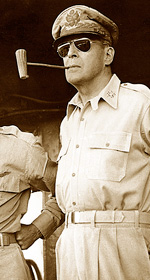 |
 |
05.31.10

General Douglas MacArthur's Principles of LeadershipGeneral Alexander M. Haig, the former Secretary of State who served in SCAP (Supreme Commander for the Allied Powers) headquarters during the occupation of Japan and in Korea, recalls a story of MacArthur's style of leadership as a young Brigadier in World War I:He was in the trenches with a unit that had to seize some ground and it was a very difficult task of leaping out of the trenches and charging through machine gun fire to the objective and said to the young officer in command, he said, "Young man, if you do this and you seize those enemy positions, I'm going to give you a Silver Star." And, the young fellow looked at him. He said, "No, come to think of it," he said, "I know you're going to do it," and he pinned the silver star on the young officer's chest and needless to say, that young fellow charged at extra speed to the objective at the other end. So, this was the kind of leadership that Douglas MacArthur exercised.MacArthur's confidence was derived from the depth of his convictions. William Addleman Ganoe recalled in his 1962 book, MacArthur Close-up: An Unauthorized Portrait, his service to MacArthur at West Point. During World War II, he created a list of questions with General Jacob Devers, they called The MacArthur Tenets. They reflect the people-management traits he had observed in MacArthur. Widely applicable, he wrote, “I found all those who had no troubles from their charges, from General Sun Tzu in China long ago to George Eastman of Kodak fame, followed the same pattern almost to the letter." 
Posted by Michael McKinney at 09:27 AM
|
BUILD YOUR KNOWLEDGE
 

How to Do Your Start-Up Right STRAIGHT TALK FOR START-UPS 
Grow Your Leadership Skills NEW AND UPCOMING LEADERSHIP BOOKS 
Leadership Minute BITE-SIZE CONCEPTS YOU CAN CHEW ON 
Classic Leadership Books BOOKS TO READ BEFORE YOU LEAD |